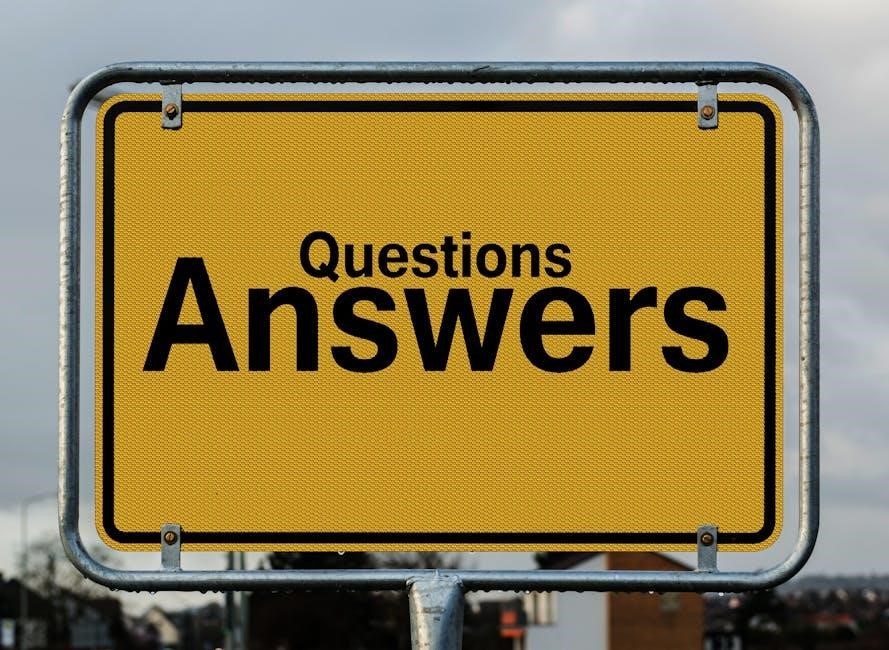Asking the right questions is a cornerstone of critical thinking, problem-solving, and effective communication. It enables leaders to guide success, educators to stimulate creativity, and professionals to unlock opportunities. “Asking the Right Questions: A Guide to Critical Thinking” by M. Neil Browne and Stuart M. Keeley is a key resource for mastering this skill, emphasizing how well-framed questions can drive innovation, improve decision-making, and enhance learning. By fostering curiosity and clarity, asking the right questions empowers individuals to navigate complex challenges and achieve meaningful outcomes in various aspects of life and work.
Why Asking Questions Matters in Critical Thinking
Asking questions is fundamental to critical thinking, as it promotes active engagement, analysis, and evaluation of information. Questions challenge assumptions, reveal biases, and uncover gaps in knowledge, fostering deeper understanding; By framing the right questions, individuals can clarify complex ideas, identify patterns, and develop well-reasoned arguments; This process encourages intellectual curiosity and helps avoid superficial conclusions. The ability to ask insightful questions also enhances problem-solving by directing focus to key issues. In essence, questioning is the cornerstone of critical thinking, enabling individuals to think logically, creatively, and effectively. It empowers them to seek evidence, evaluate perspectives, and make informed decisions in personal and professional contexts.
The Role of Questions in Effective Communication
Questions play a pivotal role in effective communication by fostering clarity, understanding, and collaboration. They act as a bridge between thoughts and understanding, enabling individuals to gather information, clarify ideas, and address concerns. Well-crafted questions encourage active listening, promote engagement, and build rapport. By asking the right questions, communicators can ensure mutual understanding, prevent misunderstandings, and foster a productive exchange of ideas. Questions also stimulate critical thinking and creativity, allowing for deeper exploration of topics. In essence, questioning is essential for meaningful communication, as it empowers individuals to seek clarity, validate assumptions, and connect with others on a deeper level, ultimately enhancing the quality and impact of interactions.

Critical Thinking and Problem Solving
Critical thinking and problem-solving are deeply rooted in asking the right questions. Strategic questioning fosters innovation, enables informed decisions, and helps identify and analyze problems effectively.
How Questions Drive Critical Thinking
Questions are the foundation of critical thinking, guiding individuals to challenge assumptions, explore evidence, and evaluate arguments. By asking the right questions, one stimulates creativity, identifies biases, and clarifies complex ideas. Browne and Keeley’s “Asking the Right Questions” highlights how strategic questioning encourages deeper analysis and problem-solving. Questions help individuals move beyond superficial understanding, fostering a mindset that seeks evidence-based reasoning. This process sharpens the ability to distinguish between relevant and irrelevant information, ensuring well-informed decisions. Ultimately, questioning is not just about seeking answers but about cultivating a thoughtful and analytical approach to life’s challenges, making it indispensable in both academic and professional settings.
Using Questions to Identify and Analyze Problems
Questions play a pivotal role in identifying and analyzing problems by uncovering root causes and examining assumptions. Strategic questioning helps clarify complex issues, reveal gaps in understanding, and pinpoint key challenges. Browne and Keeley emphasize that well-crafted questions enable individuals to dissect problems systematically, evaluate evidence, and consider multiple perspectives. By asking probing questions, one can identify biases, test hypotheses, and refine solutions. This process fosters a deeper understanding of the issue at hand, ensuring that efforts are directed toward meaningful and effective outcomes. Effective questioning transforms problems into opportunities for growth and innovation, making it a vital skill in both personal and professional contexts.

Leadership and Decision Making
Asking the right questions empowers leaders to guide success, unlock value, and make informed decisions. Strategic inquiries propel organizations forward, fostering innovation and growth through effective questioning and clarity.
Asking Questions to Guide Leadership Success
Asking the right questions is a powerful tool for leaders to drive success and inspire their teams. It fosters innovation, clarity, and collaboration, enabling leaders to navigate complex challenges effectively. By posing strategic questions, leaders can unlock value, identify opportunities, and guide their organizations toward growth. Real-life examples demonstrate how well-timed inquiries can transform challenges into breakthroughs, enhancing decision-making and problem-solving. Leaders who master this skill create a culture of curiosity and openness, empowering their teams to think critically and contribute meaningfully. Effective questioning not only strengthens leadership but also builds trust and accountability, ensuring alignment with organizational goals and values.
Case Studies of Leaders Using Strategic Questions
Leaders who use strategic questions to guide decision-making often achieve remarkable results. For instance, IMD colleagues Frédéric Dalsace and Jean-Louis Barsoux highlight how asking the right questions at pivotal moments can unlock organizational value. Real-life examples demonstrate how leaders like these propel their organizations forward by framing inquiries that stimulate innovation and alignment. These case studies illustrate how strategic questioning fosters collaboration, clarifies priorities, and drives impactful solutions. By leveraging well-crafted questions, leaders transform challenges into opportunities, ensuring their teams remain focused on shared goals. Such approaches not only enhance problem-solving but also cultivate a culture of curiosity and growth, proving that the right questions are often the catalyst for breakthrough success.

Education and Learning
Strategic questioning in education fosters critical thinking, creativity, and deeper understanding among students. Educators use questions to stimulate curiosity, encourage analysis, and promote active learning environments, enhancing overall academic engagement and growth.
Encouraging Critical Thinking in Students
Asking the right questions is a powerful tool for fostering critical thinking in students. Educators use thought-provoking questions to encourage analysis, evaluation, and problem-solving. By framing inquiries that challenge assumptions, teachers help students develop a deeper understanding of complex concepts. This approach not only enhances learning but also cultivates independence in thinking. Resources like “Asking the Right Questions: A Guide to Critical Thinking” provide strategies for designing questions that stimulate creativity and logical reasoning. When students are consistently engaged with meaningful questions, they become more adept at identifying biases, evaluating evidence, and forming well-supported conclusions. This skill is invaluable, preparing them for academic and real-world challenges alike.
Teachers’ Use of Questions to Stimulate Creativity
Teachers play a vital role in fostering creativity by asking questions that inspire imaginative thinking. By posing open-ended, thought-provoking inquiries, educators encourage students to explore diverse perspectives and generate innovative ideas. For instance, questions like “What if…” or “How might you improve this?” prompt students to think beyond conventional solutions. This approach not only enhances problem-solving skills but also nurtures curiosity and self-expression. Resources like “Asking the Right Questions: A Guide to Critical Thinking” emphasize the importance of such strategies in education. By incorporating creative questioning techniques, teachers create an environment where students feel empowered to explore, innovate, and develop unique solutions to complex challenges.

Career Development and Success
Asking the right questions unlocks career opportunities, propels business success, and fosters leadership growth. Strategic inquiries help professionals stand out, driving innovation and achieving long-term goals effectively. “Asking the Right Questions” guides this process, ensuring transformative results in any professional journey.
Unlocking Career Opportunities Through Questions
Asking the right questions is a powerful tool for unlocking career opportunities and advancing professional growth. By framing strategic inquiries, individuals can identify unseen chances, gain insights, and position themselves as valuable contributors. “Asking the Right Questions” emphasizes how thoughtful questioning can reveal new perspectives, foster innovation, and build meaningful connections. Whether in interviews, networking, or daily tasks, asking the right questions helps professionals stand out, demonstrating curiosity and a proactive approach. This skill not only enhances problem-solving but also opens doors to new roles and responsibilities, making it essential for career advancement and long-term success in any field.
Examples of Questions That Propel Business Success
Strategic questioning is a catalyst for business success, driving innovation and growth. For instance, asking, “What unmet customer needs can we address?” can uncover new market opportunities. Questions like, “How can we streamline processes to improve efficiency?” foster operational excellence. In leadership, inquiries such as, “What are the long-term implications of this decision?” ensure alignment with organizational goals. Additionally, asking, “How can we leverage our strengths to differentiate ourselves?” helps businesses stand out in competitive markets. By framing such questions, leaders and teams can identify solutions, anticipate challenges, and create value, ultimately propelling business success and fostering a culture of continuous improvement and innovation.

Customer Feedback and Satisfaction
Asking the right questions is key to obtaining valuable insights from customers, ensuring their needs are met and satisfaction is enhanced, fostering loyalty and business growth.
Importance of Asking the Right Customer Questions
Asking the right customer questions is essential for understanding their needs, preferences, and pain points. It ensures feedback is actionable, enabling businesses to make informed decisions. By framing questions that probe beyond surface-level responses, companies can uncover deeper insights, leading to improved products and services. The right questions help identify customer priorities, distinguish between needs and wants, and foster a culture of transparency. This not only enhances customer satisfaction but also builds trust and loyalty. Organizations that master this skill are better positioned to address concerns, innovate, and deliver value, ultimately driving long-term success and growth.
Best Practices for Gathering Effective Feedback
Gathering effective feedback requires a strategic approach to ensure data is actionable and meaningful. Start by clearly defining the purpose of the feedback to guide question formulation. Use open-ended questions to encourage detailed responses, while also employing scaled questions for quantitative insights. Timing is crucial; ask for feedback when experiences are fresh in customers’ minds. Ensure anonymity to foster honesty and reduce bias. Analyze and act on the feedback promptly, and communicate changes to show value. Finally, continuously refine your approach based on feedback outcomes. These practices enhance the quality and relevance of feedback, driving improvement and stakeholder satisfaction.

Recommended Reading and Resources
“Asking the Right Questions: A Guide to Critical Thinking” by M. Neil Browne and Stuart M. Keeley is a seminal resource. It offers practical strategies for formulating questions to enhance critical thinking and problem-solving. Additionally, “Smart Questions” by Chandon William and Nadler Gerald provides insights into asking impactful questions for professional success. These resources are essential for anyone seeking to master the art of effective questioning.
Overview of “Asking the Right Questions: A Guide to Critical Thinking”
“Asking the Right Questions: A Guide to Critical Thinking” by M. Neil Browne and Stuart M. Keeley is a comprehensive resource that explores the importance of critical thinking through effective questioning. The book provides practical strategies for formulating questions that enhance problem-solving, decision-making, and communication. It emphasizes how asking the right questions can lead to deeper understanding and more innovative solutions. With real-life examples and step-by-step guidance, the guide is accessible to students, professionals, and anyone seeking to improve their critical thinking skills. Now in its 12th edition, this text remains a trusted tool for fostering analytical thinking and intellectual growth in various contexts.
Other Key Resources on Effective Questioning
Beyond “Asking the Right Questions: A Guide to Critical Thinking”, several other resources offer insights into effective questioning. “Smart Questions: Learn to Ask the Right Questions for Powerful Results” by Gerald Nadler and William Chandon provides practical advice for professionals seeking to enhance their questioning skills. Additionally, online articles and academic papers, such as those from the Carnegie Endowment for International Peace, explore the application of strategic questioning in leadership and global issues. These resources collectively emphasize the transformative power of well-crafted questions in driving innovation, solving problems, and fostering learning across various disciplines and industries.
